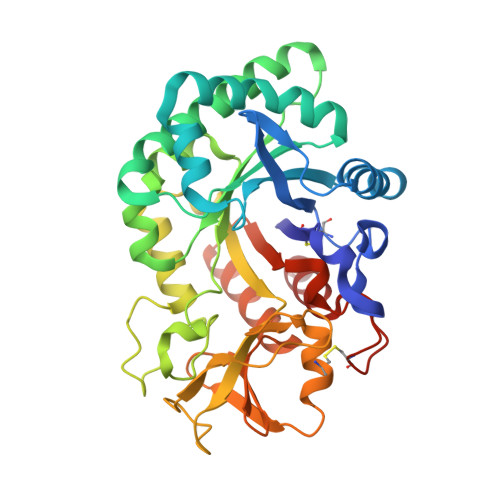A glycoprotein from mammary gland secreted during involution promotes apoptosis: Structural and biological studies.
Chaudhary, A., Kumar, V., Singh, P.K., Sharma, P., Bairagya, H.R., Kaur, P., Sharma, S., Chauhan, S.S., Singh, T.P.(2018) Arch Biochem Biophys 644: 72-80
- PubMed: 29524427
- DOI: https://doi.org/10.1016/j.abb.2018.03.006
- Primary Citation of Related Structures:
5Z05, 5Z3S, 5Z4W - PubMed Abstract:
Secretory signalling glycoprotein (SPX-40) from mammary gland is highly expressed during involution. This protein is involved in a programmed cell death during tissue remodelling which occurs at the end of lactation. SPX-40 was isolated and purified from buffalo (SPB-40) from the samples obtained during involution. One solution of SPB-40 was made by dissolving it in buffer containing 25 mM Tris-HCl and 50 mM NaCl at pH 8.0. Another solution was made by adding 25% ethanol to the above solution. The biological effects of SPB-40 dissolved in above two solutions were evaluated on MCF-7 breast cancer cell lines. Free SPB-40 indicated significant pro-apoptotic effects while ethanol exposed SPB-40 showed considerably reduced effects on the apoptosis. SPB-40 was crystallized in the native state. The crystals of SPB-40 were soaked in four separate solutions containing 25% acetone, 25% ethanol, 25% butanol and 25% MPD. Four separate data sets were collected and their structures were determined at high resolutions. In all the four structures, the molecules of acetone, ethanol, butanol and MPD respectively were observed in the hydrophobic binding pocket of SPB-40. As a result of which, the conformation of Trp78 was altered thus blocking the binding site in SPB-40 leading to the loss of activity.
- Department of Biophysics, All India Institute of Medical Sciences, New Delhi, India.
Organizational Affiliation:



















